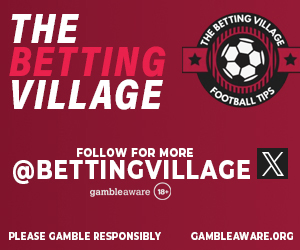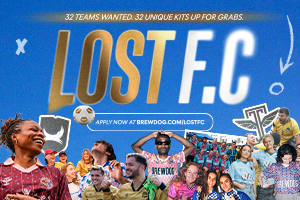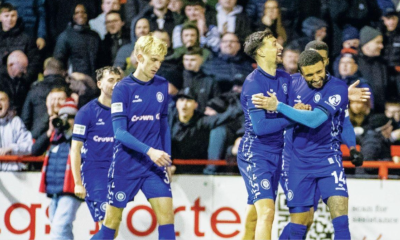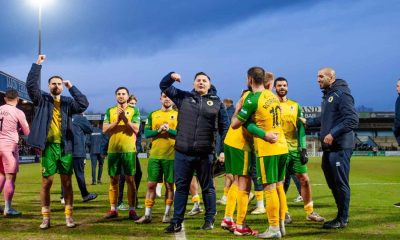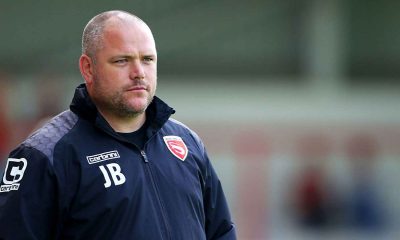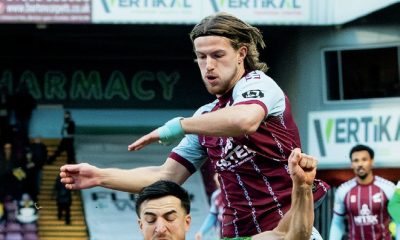

CRUNCH talks over who leads Nuneaton Borough’s rebirth will continue this week but complications over the old club’s collapse are adding to the pressure of a ticking clock.
Boro withdrew from the Southern League on January 18 having been kicked out of Liberty Way by landlords Arden Tigress – Mark Lowther and Neil Robinson, a former vice-chair of Nuneaton RFC, the rugby club based at the stadium.
Jimmy Ginnelly, Boro’s owner and manager until recently, stepped back to prompt a return but the stalemate continued.
A rescue led by Birmingham-based businessmen Gary Holliday and Steve Harris centred around buying the ground but Arden Tigress “would not engage”, leading sponsor and vicechair Ian Cook to stop play amid unmanageable costs.
Undeterred, Holliday and Harris, flanked by Boro secretary Mark Grimes and Nuneaton legend Kyle Storer, held an open meeting on Wednesday to showcase their vision for phoenix club AFC Nuneaton. Initially groundsharing seven miles away at Hinckley Leicester Road, the duo envisage acquiring land to move back to Nuneaton within two seasons but only if Boro’s sponsors and fans are on board.
The reaction was mixed with the Nuneaton Borough Supporters’ Co-Operative leading calls for fans to have a stake in the club, not just representation on the board. The duo’s lack of a connection to the club or town and the practicalities of playing outside Nuneaton were also questioned.
A steering group involving the co-operative, fans, sponsors and local stakeholders is set to meet again tomorrow with assistance from the Football Supporters’ Association (FSA), to discuss what happens next but the situation remains fraught with difficulty. FA rules state clubs that have dropped out can only apply to come back at Step 5 or below and must restart at least two levels below the one the old club left.
Initial applications must be in by March 1 with the full submission, “including evidence of security of tenure” at a ground, required by March 31.
If more than one enters the race, the FA decides which is deemed the official continuation, although co-operative treasurer Jim Evans said a battle for supremacy was not desirable and Holliday confirmed his group would “not be somewhere where we are not wanted”.
The other sticky issue is Boro Leisure Limited – the old company – still existing without any directors. With no registered officer, the process of closing it down is likely to be lengthy.
That does not preclude a relaunch under a new firm but its status will inform the FA’s decision on whether any new club is recognised as Boro’s continuation, potentially affecting the level it ends up at. Also, if access to Boro Leisure is acquired then whoever does so could apply to re-enter the National League System, provided they hit the March 1 deadline.
That would seem unlikely with the firm saddled with debts and no assets but it is understood there are stakeholders working in the background to fully understand the terms of the firm’s lease with Arden Tigress, and whether the ongoing existence of Boro Leisure could influence a comeback being launched in Nuneaton.
Jim Evans is treasurer of the Nuneaton Borough Supporters’ Co-Operative and one of six members of its board.
What do you make of the new consortium, and what would you advocate at this point?
JE: These guys keep talking about Step 6, that is probably not as easy as they think given the history of the club.
I think we are all convinced that at Step 6 or 7, the fans could form and run a club. That is potentially an alternative to what these guys (Holliday’s group) are doing.
They still have quite a few hurdles to get over to get a team on the field for next season, so it is still an option (for the co-op).
There is a view from everyone that we don’t want two phoenix clubs. That has happened in other towns and it has not ended well.
We have seen a genuine wish for proper transparency and proper fan involvement and ownership in the club.
What does that look like? A guaranteed level of shareholding and a seat on the board, still allowing the consortium to run it while the fans have that overview?
JE: Yes, that is essential really.
There has been so little transparency in the past and it has always gone wrong – how do you reassure fans that it is not going to happen again?
Just being optimistic is not enough, you have to demonstrate to the fans that they really are involved in running the club.
If we work with these guys, I think they are going to set up a private limited company, it is not going to be a fan-owned club, but they have to accept that we have to do things a bit differently to how things have been done in the past and a bit differently to how they originally perceived it, which, to be honest, was ‘we are going to come in to run your club for you’.
I think they are starting to see now that such an approach would not quite cut it. Hopefully they have had time to reflect on the feedback they have had and we can come to some sort of sensible agreement.
If that doesn’t transpire, what would be the co-op’s next step?
JE: It depends when we hear a bit more from them.
That (Wednesday’s meeting) was a sales pitch, we want to hear more about a proper business plan.
It may be that the co-op says they have not convinced us but a lot of fans just want to see football. The idea that a team could be up and running next season, which is probably not as easily done as these have indicated, is still attractive to a lot of people. We will make the point of how we see the realities.
How are you going to measure the opinion of fans?
JE: Maybe we will have a vote, I don’t think that is out of the question.
I think it would have to be of the fanbase as a whole to be credible if we did, a lot more people in the co-operative would maybe lean more towards (outright) fan ownership.
You have to be open and honest and find a way to go to the whole fanbase. We will have meetings over the next week or so internally to see what the next steps are.
What could the consortium do to convince you?
JE: A written contract between them and the fans would be very helpful, a proper commitment to and explanation of how the fans are going to be involved in the running of the club.
It is easy to say the right things, we have heard it many times before. We want to do things properly.
Is there a risk of allowing the painful experiences of the past to tarnish an opportunity?
JE: Yes, that is definitely the case.
When I have spoken to these guys, I have really tried to stress that the scepticism they may see from Nuneaton fans is not personal, it is based on experience. The Boro fans wear the scars of that so it is not surprising.
I think they are starting to take that on board and think of this as a hurdle they need to get over, whereas the initial approach was very much that they were going to come and run the club for us. We’ll see what happens.
Gary Holliday is the leader of the consortium proposing to relaunch Nuneaton Borough as AFC Nuneaton
With the clock ticking towards the application deadline, what is your understanding of the situation with Boro Leisure?
GH: My understanding – and it could be completely incorrect, this is based on information I have had today (Wednesday) – is that we won’t be allowed to be a continuation (of the old club) until that is resolved, that we may have to form as a completely new club at the very bottom.
Would you wait a year to resolve those issues or go straight ahead with a new club?
GH: We wouldn’t wait a year, we wouldn’t want to deprive the community of a football club for a year.
Starting a league or even two lower, I think our biggest challenge generally is momentum and if we can get this right with the backing from sponsors and fans and come out of the gates flying, whatever league we are in, I think that is more important in the bigger scheme of things, getting things going and the place rocking.
How long do you envisage the club being based in Hinckley/out of Nuneaton for?
GH: That is really tough – how long is a piece of string?
We are restricted by opportunities in the short-term, there are not other stadiums to jump into, so the solution to that is finding some land for a purpose-built stadium.
That does not happen overnight but the worst-case scenario, if we were looking at a third season out of Nuneaton something would not have gone to plan, so a season, two seasons absolute tops before we would want to be back in Nuneaton.
What would that look like? Modest and build on it as you go?
GH: I think it would have to be because at the moment, why would you build a big stadium when you have a few hundred people going?
It would have to be a common sense approach but designed in a way that you could bolt onto as you progress through the leagues and as the crowds, hopefully, grow with that.
Leicester Road is a cracking looking place for the level it is at. Something of that kind of standard, eventually, that we could call our own, would be phenomenal.
What is the prospect of your consortium picking up Boro Leisure in an attempt to try to leverage access to Liberty Way?
GH: We expressed an interest in buying Liberty Way outright, the landlord would not engage whatsoever.
From an investment point of view, taking over Boro Leisure without any assets of any description, I would be surprised if anyone did. We certainly won’t look at that now.
The original proposal we put together included the whole package, being able to buy the land so the club had that base forever and to knock off a section of the debt, chip away at it.
I would be stunned if anyone did that.
What reasons did Arden Tigress give you for not engaging over Liberty Way?
GH: It was a two-sentence response. No interest in entering negotiations over the sale of the land or conversations regarding a lease either, I just don’t think they wanted the football club there.
There was scepticism in the room over you coming in, with a lot of mention of fans having their fingers burned in the past – how do you get around that?
GH: With great difficulty if I am honest.
These people don’t know me from Adam. We do have good intentions and fundamentally, we are decent fellas with young families.
As we said in the meeting, we don’t have to do this. We want to do this. We are quite happy to risk a degree of personal finance but if we can’t get everyone on board and singing from the same hymn sheet then it is not a sustainable project for us. At that point, we would have to walk away because we would have no choice.
I said to one of the fans, if people in the room think me and Steve are going to put in £250,000 a year for the next three years, crossing our fingers that the sponsors may come to the table, I don’t think that is realistic.
There were people in the room that would not do that for Nuneaton and certainly wouldn’t do it for a club that they don’t love so expecting outsiders to do it would be unrealistic.
We do have an understanding and expectation that investment will be needed to get the ball rolling, whether that is personally from me and Steve or from our backers, but we have to take a sensible approach to this.
The fact the club has racked up a £500,000 debt, at least, over the past 10 years shows there has to be a sensible, business-like approach.
What happens next?
GH: The plan is to have a follow-up meeting with the co-op group once they have checked with their members.
On paper, we don’t need anyone’s approval to start a club but we don’t want to just start a club, we want to start something that the whole community gets involved with.
If we don’t have the backing of the sponsors and supporters, the question would not necessarily be about whether we could get it off the ground but more whether we should.
Many people have thrown money down a black hole when it comes to Nuneaton, we are not going to do that. We are taking a more sensible, sustainable, long-term approach so the follow-up meeting with the co-op is one thing, and I’ll look to set up something similar with the sponsors.
The feedback from some of the sponsors has been a bit disappointing, I think because they have had their fingers burned. Some of them are quite reluctant to get involved.
Having the club outside the borough of Nuneaton is another of the challenges that we have to overcome with the sponsors. With the fans, we have talked about transport links, how we get fans over to Hinckley, so there is a lot of work to do before we can open the doors on day one.
We are under no illusions, we don’t think that all these things will be a walk in the park, flowery and rosy, it is not going to be like that.
If the fans decide to go their own way, would you be prepared to walk away?
GH: Yes. We have looked at multiple football clubs but this was the one that was the most attractive to us, not because we think it would generate the most revenue – if anyone thinks football clubs are a pot of gold, they are kidding themselves.
Ultimately, we will not be somewhere where we are not wanted. We think our way of leading this will be right for Nuneaton but if the fans and sponsors don’t think that then that’s okay, we are big enough and ugly enough to walk away and say we tried. We’d either find another club or get on with our lives.
This will be incredibly tough with the support. Without the support it would be nigh-on impossible so yes, that would be enough for us to say ‘no hard feelings’.
How and when do you expect to get that answer?
GH: In the next two weeks. The co-op has another meeting planned, we will then have a follow-up with them.
One of the leads of the co-op is quite supportive, the other is quite anti. They are split, and if they are split then it stands to reason that the others are split.
The sponsors are a challenge because they have been burned so I would say we are going to have to make a decision in the next two weeks because there is a hell of a lot to do.
Issues such as fans on the board and shares in the club were raised by the co-op and individual supporters – where do you stand on that?
GH: Originally, I thought just having a fan on the board would have been enough. The one thing I took from the meeting was that it wouldn’t be enough.
Having a stake, something people can call their own forever, has to be the way forward with this, whether that is with us or through someone else.
The challenge is how you do that. If it is a fans’ group, who leads the fans’ group? What if the fans don’t agree with the group? There are a million and one challenges with that but I don’t think any of it is insurmountable if we go forward.
The passion that exists for this club to survive really came through, something clicked that just giving a couple of them a role on the board is not enough, these guys want more and I think we can deliver that.
What can you tell us about the rest of your backers?
GH: There are a multitude of business people, they are not Nuneaton people. I work in warehousing and logistics, there are people from that industry, people from the building industry, but these are serious investors who don’t want to run a football club like me and Steve do, they want to invest in a business that would generate tangible returns and assets.
If we didn’t have that, a lot of that backing would walk away but we have a degree of backing from people who are similar to me and Steve with the sporting, competitive element who would invest.
The bigger picture for us is owning the land, owning the ground in conjunction with the fan ownership, something that is tangible that has an asset.
The investors will want a return at some point, whether that is from Nuneaton or another club…
A financial return?
GH: Yes, I think so.
Is that realistic in the pool you are fishing in?
GH: I don’t think it is realistic in the next three-to-five years, but longer-term.
People have to be realistic, the club has failed multiple times, it is not an attractive proposition.
We had NDAs (non-disclosure agreements) with some of our backers, as soon as we got them to sign and revealed which club it was, a lot of them walked away because of the reputation Nuneaton has.
There is no Arab sheikh with a £1 billion to save the day, it is going to be a combination of people who want different things from it, some want that competitive sporting element that I don’t have in life since I stopped playing football, but others will look at it as a genuine business investment, the fact it is a football club will be irrelevant to them.
My job is to manage expectations so whatever the investment looks like, we have the right ones. Ultimately they are backing me and there will be pros and cons dependent on which club it is.
One club we looked at was a couple of leagues higher, they owned the land and had no debt whatsoever but the potential for that club isn’t what it is at Nuneaton, which is why I am steering them towards Nuneaton.
I think the longer-term prospects from a community point of view are off the charts here, from a business point of view I also think we could potentially generate that revenue interest to make it an attractive investment proposition.
It is often an alien concept to people that anyone would take any kind of return from a football club at this level – however reasonable it would be to take it. They want to see that go back into the squad or club, can you understand that?
GH: I get that, 100 per cent, but that comes with a level of reality.
Me and Steve are not the norm, people who come into it with sporting, competitive interests.
There will be a level of investment required (with an) expectation that it would generate a financial return, the question is managing it in a sustainable way that doesn’t destabilise the club.
There are good and bad examples of it. There will be examples of sustainable, profitable football clubs that can offer the dividends and returns to investors where it is done in a sensible way, but we are decades away from that, that is not something that would happen in the next five years because there is no profit anyway.
Would you continue with this without those backers?
GH: I think so, yes. The challenge for us is the backing of the supporters and sponsors, without that it is not a sustainable business.
Me and Steve want to do this but not if it is wholly reliant on us bankrolling it. We both have young families and businesses, there is an element of investment that we are prepared to commit to – what that looks like I don’t know yet, we will put in as much or as little as we need to in order to get the ball rolling – but if we can’t get the sponsors to the table and quite quickly, the whole project is not sustainable and then there is a conversation for me and Steve to have.
The flip side of that is sponsors say they will put in all the money we want but all the supporters say no, not interested, we’re not coming to Leicester Road, then that is not what we are doing this for. We are doing it to tick every box, that is the hope and the aim.
This only works with us leading it, the sponsors backing us, the supporters backing us and every single person being on the same page, pulling in the same direction. I don’t think that hasn’t been the case for the past 10 or 15 years at the club, but I genuinely think we can be the ones to change that.









